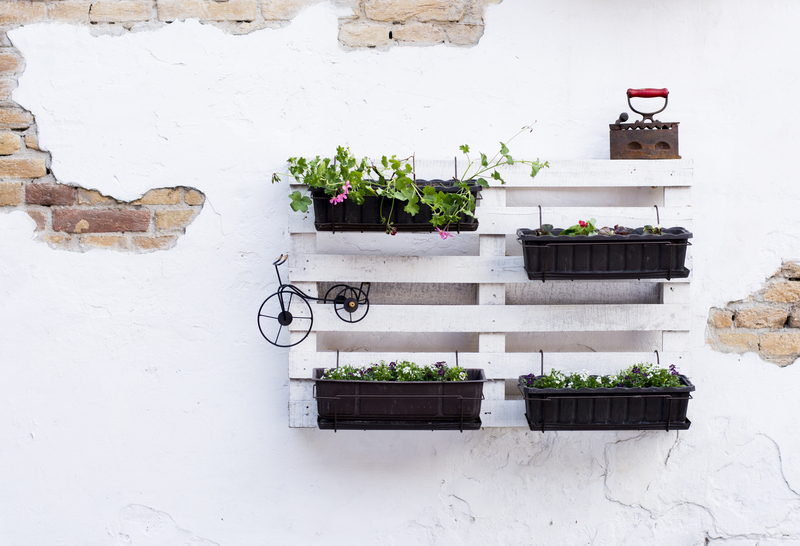Revolutionize Your Plant Pot Disposal Routine: A Comprehensive Guide
Are you tired of stacks of old pots cluttering your garden shed? Do you worry about the environmental impact of simply throwing away your plastic planters? It's time to revolutionize your plant pot disposal routine and adopt eco-friendly, sustainable, and convenient solutions!
Why Rethink Plant Pot Disposal?
Gardening has soared in popularity, but with it comes a mountain of leftover plant pots. These can accumulate quickly, leading many gardeners to ask: What's the best way to dispose of old plant pots? The answer isn't as simple as tossing them in the trash. In fact, transforming your approach to plant pot disposal can lead to a more sustainable gardening lifestyle and a healthier planet.
- Environmental Impact: Many plant containers, especially plastics, are non-biodegradable and can remain in landfills for centuries.
- Space Management: Leftover pots take up space and create clutter at home and in community gardens.
- Cost Efficiency: Proper plant pot recycling methods can save money for you and local horticulture businesses.
Let's explore how you can revolutionize your plant pot recycling routine and contribute to a greener future.

Understanding the Problem: What Types of Plant Pots Do You Have?
Before you can develop a smart plant pot disposal method, it's crucial to identify the materials of your old pots. The main types include:
- Plastic Pots: Lightweight, affordable, and most commonly used.
- Ceramic & Terracotta Pots: Durable and aesthetic, but breakable.
- Biodegradable Pots: Made from materials like coconut coir, cow manure, paper, or peat moss.
- Metal Pots: Typically used for decorative purposes.
- Wooden Planters: Less common, but popular for raised beds and larger plants.
Knowing what you have helps you choose the best plant pot disposal or recycling method for each type.
Eco-Friendly Plant Pot Disposal Methods
1. Reuse and Repurpose: Give Old Pots New Life
One of the simplest ways to reduce waste is to reuse what you already have! Here's how you can get creative with your old plant pots:
- Use as Seed Starters: Smaller pots are ideal for starting seedlings each spring.
- DIY Decor: Paint, decorate, or stack them for artistic garden installations.
- Storage Bins: Organize garden tools, bulbs, or small household items with old pots.
- Craft Projects: Turn pots into bird feeders, candle holders, or fairy garden components.
- Gift Planters: Fill with cuttings or herbs as thoughtful, reusable gifts for friends and neighbors.
Repurposing plant pots is a sustainable option that prolongs their lifespan and adds a creative touch to your home or garden.
2. Local Recycling Programs: The Greenest Choice
Did you know that many communities now offer dedicated plant pot recycling options? These programs ensure your pots are processed properly and often reused in the horticultural industry.
- Check with your municipal recycling program for specific instructions on recycling plant pots in your area.
- Many garden centers and nurseries sponsor recycling drop-offs--call ahead to find out what materials they accept.
- Some big box stores offer seasonal pot recycling drives.
Remember: Always rinse out pots before recycling to prevent contamination. Remove all soil and plant residue!
3. Compost or Biodegrade
If you use biodegradable pots, such as those made from peat, cow manure, or coconut coir, you can break them into pieces and add them directly to your compost pile or garden soil. These pots will naturally decompose, enriching soil structure and reducing waste.
- Compostable Pots: Tear up and mix into your compost bin for nutrient-rich humus.
- Buried in Garden Beds: Break up and bury beneath mulch or directly in garden beds.
Biodegradable plant containers are a great choice for gardeners striving to minimize their carbon footprint.
4. Upcycling for Community Projects
Many schools, community gardens, and urban farms welcome second-hand pots. By donating, you support local green spaces while clearing your own clutter. Check for:
- Donation bins at local garden centers
- Announcements seeking pots on community social media pages
- Direct outreach to non-profits and educational gardens
Upcycling plant pots isn't just about waste prevention--it's about supporting your local gardening community!
Smart Plant Pot Disposal for Every Material
Plastic Plant Pots: From Problem to Solution
Plastic pots may be the trickiest to dispose of responsibly. Many curbside recycling programs do not accept them due to their type of plastic and residue. Here's how to handle them:
- Look for #5 or #2 marking: These are more easily recycled. Clean them thoroughly and check with local programs.
- Join a recycling scheme: TerraCycle and other eco-organizations offer specially designed pot recycling programs.
- Reuse as long as possible: Plastic pots degrade much slower than other materials, so repeated use for multiple seasons is optimal.
Ceramic, Terracotta, and Clay Pots
Broken or chipped? Don't toss them just yet. Non-porous pots are difficult to recycle, but they can be used creatively:
- Shred or crush to use as drainage material in new pots or garden beds.
- Create mosaic art for garden paths and stepping stones.
- Donate intact pieces to local art centers or schools.
Metal Pots and Planters
Metal plant pots can be recycled at most scrap metal facilities. If they're rusted or damaged, consider:
- Repurposing for indoor storage or DIY projects
- Donating to metal recycling centers rather than throwing them away
Wooden Planters
Wooden containers can be composted or chipped as mulch if untreated, and reused as raised bed borders or compost bin walls.
- Avoid disposing if treated with toxic chemicals--these cannot be safely composted.
Biodegradable Plant Pots
These are the most sustainable option for green disposal. Simple steps for responsible disposal include:
- Break up and add to compost or garden beds as organic matter
- Use directly in soil--roots will grow through, and pot decomposes naturally
Innovative Ways to Reuse and Recycle Plant Pots at Home
1. Vertical Garden Plan
Use old pots to install a vertical planter wall. Arrange multiple containers onto a wooden panel or secure to a fence, and fill them with aromatic herbs or colorful annuals.
2. Garden Edging
Half-bury pots upside down to create quirky and colorful garden borders. This not only recycles your pots but also adds a unique style to your landscape.
3. Indoor Organization
Small pots are perfect for storing office supplies, makeup, or kitchen utensils. Paint or decorate to match your interior style for a touch of eco-friendly decor.
4. Kids' Craft Projects
Get your children involved in upcycling by turning old pots into fun animal shapes, planters for seedlings, or painted gifts for family members. This teaches the importance of reusing materials and sparks creativity!
5. Stabilizing Garden Structures
Use heavy or broken pots as bases for lightweight garden structures like bamboo trellises or decorative fences.
How to Make Plant Pot Disposal Routine Effortless
Step 1: Set Aside a Designated Storage Area
Place a labeled bin or shelf in your garage or garden shed for collecting empty plant pots. Sort by material and size to simplify reuse and disposal later.
Step 2: Regularly Sort and Clean
Establish a habit of rinsing and sorting pots after each planting season. This keeps them ready for recycling or donation at any time.
Step 3: Stay Informed about Local Options
Connect with local garden centers, recycling facilities, and waste management services. Since plant pot disposal options vary by region, staying informed ensures a responsible process.
Step 4: Educate and Involve Others
Share your knowledge with neighbors, gardening clubs, and online communities. The more people embrace responsible methods, the greater the environmental benefit!
The Future of Plant Pot Disposal: Sustainable Innovations
The movement toward eco-friendly plant pot disposal is driving exciting changes:
- Industry Shifts: More nurseries are moving towards using biodegradable or recyclable plant containers.
- Take-back Initiatives: Major retailers and nurseries frequently offer plant pot collection programs.
- Emerging Materials: New pots made from mushroom mycelium, rice hulls, and compostable bioplastics are on the rise.
By supporting these innovations and making conscious choices in your disposal routine, you help expand demand for sustainable practices in horticulture.

Frequently Asked Questions About Plant Pot Disposal
Can I recycle black plastic plant pots?
Many recycling facilities struggle with black plastics, as sorting machines often can't detect the color. Instead, look for specialized recycling programs at nurseries or consider reusing them as much as possible.
Is it okay to put broken ceramic or terracotta pots in household recycling?
No--these materials cannot be recycled curbside. Instead, use for garden drainage, landscaping projects, or donate to artists for mosaic crafts.
How can I dispose of large quantities of old plant pots?
Organize a community pot exchange or coordinate with local gardening centers, many of which accept large volume drop-offs during spring and fall planting seasons.
Can biodegradable pots be planted directly in the ground?
Yes! Most biodegradable pots are designed for transplanting whole, reducing root disturbance and eliminating waste.
Conclusion: Transform Your Plant Pot Recycling Today
Revolutionizing your plant pot disposal routine isn't just a trend--it's a necessary step for responsible gardening and environmental stewardship. By reusing, recycling, and repurposing your old plant pots, you support a healthier ecosystem, declutter your space, and inspire positive change in your community.
- Make reuse your first thought--get creative before you throw out.
- Participate in local pot recycling initiatives.
- Switch to biodegradable or sustainable pot options for future gardening projects.
If each gardener adopts just one new eco-friendly plant pot disposal habit, the collective impact can be tremendous. Start today and lead your neighborhood towards a greener, cleaner future!
Ready to take the next step? Share your own tips for responsible plant pot disposal in the comments and inspire others to join the revolution.